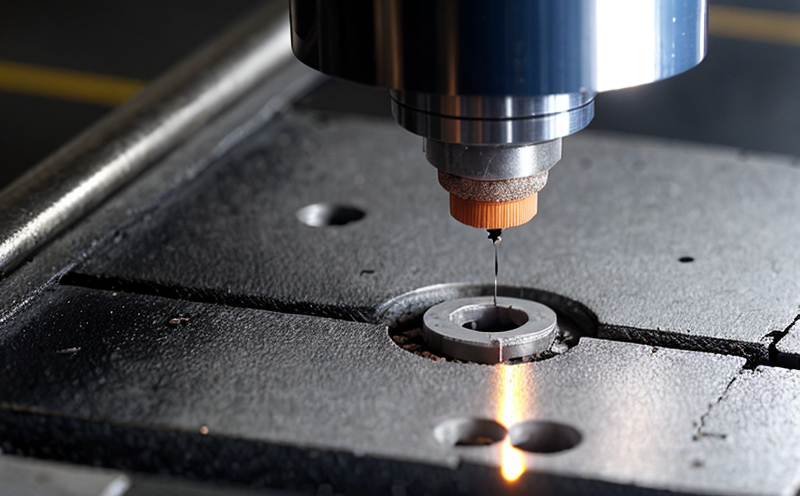JEDEC JESD22-A136 Flip-Chip Reliability Failure Testing
The JEDEC JESD22-A136 test is a critical procedure used in the semiconductor and microchip industry to evaluate the reliability of flip-chip packages under various stress conditions. This test method simulates real-world scenarios such as temperature cycling, thermal shock, and mechanical loading to identify potential failure points early in the product lifecycle.
The JESD22-A136 standard is widely recognized for its rigorous approach to ensuring that flip-chip packages meet stringent reliability requirements specified by industry standards. It focuses on identifying defects or weaknesses within the package structure, solder joints, and die-to-package interconnects that could lead to premature failures in end-use applications.
The testing process typically involves placing the flip-chip device into a specialized chamber where controlled environmental conditions are applied systematically over time. These conditions include temperature changes ranging from -55°C to +125°C with cycles lasting up to 96 hours, depending on the specific requirement set by the customer.
During these cycles, detailed measurements of electrical parameters such as resistance and capacitance are taken continuously throughout each cycle to monitor any changes indicative of impending failure. Additionally, visual inspections using high-resolution cameras capture images of the device during both pre- and post-test stages allowing for precise defect localization.
After completing all specified cycles, further analysis may be conducted including cross-sectioning samples where necessary followed by scanning electron microscopy (SEM) examination to determine root cause failures based on metallurgical evidence. This comprehensive approach ensures accurate diagnosis of issues related to material selection, design flaws, or manufacturing processes which could impact overall product quality and customer satisfaction.
The importance of this testing cannot be overstated given today's trend towards increasingly smaller yet more powerful integrated circuits. By employing advanced techniques like JESD22-A136 early in development cycles, manufacturers can significantly reduce time-to-market while minimizing risks associated with field failures later down the line.
For quality managers responsible for ensuring consistent product performance across different environments, compliance officers overseeing regulatory requirements, R&D engineers tasked with improving existing designs or developing new innovations, and procurement professionals seeking reliable suppliers - investing in robust testing like JESD22-A136 provides invaluable insights into how best to optimize their processes.
Through meticulous adherence to industry standards such as JESD22-A136, laboratories can provide clients with confidence that they are delivering high-quality semiconductor components that meet or exceed expectations. This not only enhances brand reputation but also fosters long-term relationships built on trust and reliability.
Eurolab Advantages
At Eurolab, we pride ourselves on offering unparalleled expertise in performing JEDEC JESD22-A136 tests with precision and accuracy. Our state-of-the-art facilities equipped with cutting-edge equipment ensure that every test adheres strictly to the specified parameters outlined by the standard.
- Experienced Technicians: Our team consists of highly trained professionals who possess extensive experience in conducting complex reliability assessments.
- Comprehensive Reporting: We provide detailed reports highlighting key findings along with recommendations for improvement whenever necessary.
- ISO/IEC 17025 Accreditation: Our laboratory maintains strict adherence to international quality management system standards ensuring consistent results across all tests performed.
The combination of these factors makes Eurolab the ideal partner for any organization looking to enhance their semiconductor testing capabilities. Whether you're a small startup or large corporation, our commitment to excellence guarantees that your products will undergo thorough evaluation before reaching market.
Environmental and Sustainability Contributions
The practice of conducting JEDEC JESD22-A136 tests plays an essential role in promoting environmental sustainability within the electronics manufacturing sector. By identifying defects early on, this testing helps prevent unnecessary production runs and subsequent waste generation associated with defective products reaching end-users.
- Reduced Waste: Through accurate identification of issues during development stages, manufacturers can minimize scrap rates thereby reducing the amount of raw materials used and energy consumed throughout manufacturing processes.
- Eco-Friendly Products: Ensuring that only high-quality components make it to market means fewer recalls later down the line which contributes positively towards reducing electronic waste in landfills.
In addition, by adhering strictly to environmental regulations and best practices during testing procedures, Eurolab ensures minimal impact on local ecosystems through responsible handling of hazardous materials. This aligns perfectly with our commitment to fostering sustainable development within both the laboratory and broader industry communities.
Competitive Advantage and Market Impact
The ability to perform thorough JEDEC JESD22-A136 tests gives organizations a significant competitive edge in today’s fast-paced technological landscape. In an era where consumers demand increasingly sophisticated devices, reliability has never been more crucial.
- Enhanced Reputation: Clients trust Eurolab's rigorous testing methods which translate into enhanced brand reputation among customers and partners alike.
- Increased Efficiency: Early detection of potential issues allows for rapid problem-solving resulting in faster time-to-market for new products.
Furthermore, by staying ahead of regulatory trends and continuously improving upon current methodologies, Eurolab helps companies maintain compliance with evolving standards while ensuring continuous improvement. This proactive approach positions organizations not only as leaders within their respective markets but also pioneers in sustainable practices throughout the industry.





